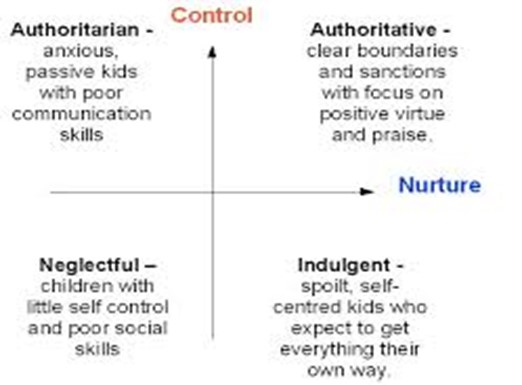1. Introduction
A newborn can be perceived as a little white canvas where parents are responsible in the drawing process either in red, green, yellow, blue or even black. If it is drawn carefully, in the end the canvas would be beautiful, but if it is drawn recklessly, then the canvas would be looking far from beautiful. Parents’ roles in shaping their child’s personality are very much important. It should become the parents’ top priority in instilling good values in their children as the Prophet Muhammad said, “A child is not born except in a state of nature, and parents are the ones who will shape the child to be a Jew, a Christian or a Zoroastrian”.
The parenting styles that will influence the children’s behaviors and personality when they grow up in later years. Lack of knowledge in the right ways of teaching their children has been the most often excuse given by parents. Nevertheless, in this savvy world, all of these information and knowledge’s can be assessed within their fingertips. It is up to the parents themselves to search and be equipped with that knowledge.

2. Variety of Parenting Styles
Parenting skills can be classified into few types and parents have the freedom to choose the style that they want to practice. However, the style selection is often influenced by the local cultures. For examples, parents in the Western countries such as the United States, France and United Kingdom often regard their children as their friends. Countries in the East such as Malaysia, China and Indonesia on the other hand raise their children with a reminder that they sometimes need to be strict. Because of that, few factors need to be taken into consideration before the decision on the parenting styles can be made.
Baumrind (1971) explained that the parenting style can be divided into three types which are authoritative, authoritarian and permissive. Parents who are alert will try to get the information regarding all types of parenting before choosing the right one to be practiced. Azizi&Jumat (2010) stated that parents should not be confined to just one style of upbringing, but be more open to swap to different style depending on the needs.
3. Type of Parenting
In raising their children, parents should not be too strict and at the same time not to be too gentle. The parenting style and the teaching process are very important so that the children are raised to be a person of excellence and distinction (Norhaniyanti, 2010). Clear rules on the rights and the wrongs as well as reasonable explanations need to be told to the children so that they know it is wrong to use foul language and it is right to be good with animals. Besides that, the parents’ parenting style plays an important role in shaping the personality among teenagers. Mohd Rodzik (1998) stated that the parents’ parenting style is among the factors that influence teenagers’ personality as well as other factors that could influence the development of personality among teenagers.

Figure 1 Different Type of Parenting Style
3.1 Authoritative style
There are two factors that become the benchmark in every parenting style which are the level of control and responsibility. For this first type of parenting style, the level of control and responsibility to the children need to be at the same level. Parents need to have a rational level of control and responsibility. Parents who practice this kind of parenting style tends to be more democratic and indirectly will influence their children to be more responsible, positive minded, competent and socially active. Authoritative parents will also enable the children to be more independent and wise in putting limits in their behaviors.
Besides that, the authoritative upbringing style uses “give and take” as its main principle. Teenagers who are raised with this style will have a high level of confidence and are bolder in expressing their opinions. Authoritative parents will also influence their children to be more energetic, exploitative, have high curiosity, have more dedication, can control and be satisfied with themselves as well as be more positive towards their peers (Baumrind, 1989).
3.2 Authoritarian styles
Teenagers that are showing rebellious behavior, fear, rage, shy, anxious and less motivated are the result of the authoritarian parenting style. Their parents have high levels of controlling but have a low level of responsibility. It causes the children to have a low level of self-confidence and independence. This kind of parenting style indirectly gives less freedom to their children to do whatever that they like. High level of controlling cause their children to blindly obey their parents without thinking and in the end, causes them to be passive. According to Bee and Boyd (2002), authoritarian style reflects negative effects on the children because the children will have poor social skills, prone to become aggressive or passive person as well as having unstable mood.
3.3 Permissive styles
Parents who are permissive show low level of control , but high level of responsibility. They are very open to their children until there are no limits of respects between the parents and their children. Teenagers who are born into the family that practices this parenting style are more impulsive and have a high level of demands. They are often said to be less explorative, less independent and exhibit a tendency to be independent and unable to control themselves. Parents who are permissive are spoiling their children. Lack of control from the parents also leading to aggressive behaviours as well as failure in the child’s education. These teenagers are also often associated with social problems and deviant behaviours.
4. Effects of Teenagers’ Behaviors
Nowadays, there is a lot of incidents happening in our country, often associated with teenagers. Other than excessive promiscuity, alcohol and drug abuse also becoming the main topics. Due to the high frequency of occurrences, these incidents that were once extraordinary things in our society today are becoming a norm.
5. External Factors
Children are often influenced by their parents’ parenting style. However, undeniably, there are external factors that can affect the child’s behaviors. One of the influencing factors that is often associated with the teenagers’ behaviors are their environments. Apart from living in unhealthy environment where crimes are everywhere, drugs can also be easily found and there is a lack of law enforcement. Furthermore, the home environment can also be the reason why teenagers are exhibiting deviant behaviors. Researches revealed that parents play an important role in shaping their children behaviors but do not play a role in providing as well as in taking action against behaviors (Azizi &Sofie, 2010).
6. Conclusion
Parents’ roles in raising and educating their children are very crucial. Adolescence is a phase where one gets to know themselves, when they will first recognize the world in order to establish a good self-concept. Good parenting style is very much needed in order to raise teenagers who are cognitively competent, highly motivated, high level of independencet and are able of socialise. Besides that, parents need to be a good role model to their children. The best upbringing style need to be chosen that would eventually shape the children to be of good manners.
7. References
- Corak Didikan Ibu Bapa Dan Kesannya, http://anjakanparadigmamental.blogspot.com/2012/12/corak-didikan-ibu-bapa-dan kesannya.html
- Gaya asuhan ibu bapa mempengaruhi tingkah laku dan sikap anak-anak, http://scilikmolek69.blogspot.com/2012/05/minggu-4-gaya-asuhan-ibu-bapa.html
- Muktarudin, N. (2010). Hubungkait Antara Gaya Asuhan Dan Gaya Pembelajaran Terhadap Masalah Sosial Dan Masalah Pembelajaran Di Kalangan Remaja, Universiti Utara Malaysia.
- Perkembangan Program Pendidikan Awal Kanak-Kanak,http://perkembangankanakkanak.blogspot.com/2012/05/kanak-kanak-dan-keluarga tanggungjawab.html
- Yahaya, A. dan Aliju.M. J. (2010). Kaedah Asuhan Ibu Bapa, Fakulti Pendidikan, Universiti Teknologi Malaysia.
- Yahaya, A. dan Bahari. M. S. (2010). Gaya Asuhan Ibu Bapa Remaja Terhadap Tingkah Laku, Fakulti Pendidikan,Universiti Teknologi Malaysia.
| Last Reviewed | : | 1 Mac 2017 |
| Writer | : | Hairulnizam bin Abdullah |
| Translator | : | Hairulnizam bin Abdullah |
| Accreditor | : | Ruhana binti Mahmod |







